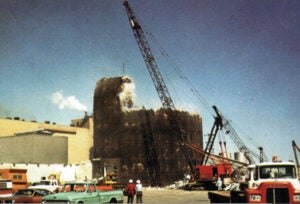Chile Supreme Court Strikes Plans for $5B Coal Plant. Chile’s Supreme Court on Aug. 28 rejected the $5 billion Central Castilla thermoelectric power plant planned by Brazilian firm MPX Energia and Germany’s E.ON, citing environmental reasons. Developers argued that the 2,100-MW plant is needed by Chile, the world’s foremost copper producer, which struggles with high power prices and inadequate electricity infrastructure. The court ruled that Castilla could “harm the constitutional guarantee that one can live in an environment free of pollution,” but it said the companies could resubmit an environmental impact study that addresses the court’s specific concerns. The court’s decision could have major implications for developers of future power projects in the country, industry analysts said.
Work to Continue on Belo Monte Dam. Brazil’s Supreme Court in an Aug. 27 preliminary decision approved resumption of work on the $13 billion Belo Monte hydroelectric dam in the Amazon until it could consider the merits of the case. A judge from Brazil’s Regional Federal Tribunal had on Aug. 17 called for an immediate halt to construction on the 11-GW project, ruling that affected tribes in the Amazon state of Para had not been consulted before Brazil approved the project in 2005, as is required by the country’s constitution and the U.N. Treaty 169 on indigenous rights. The Norte Energia consortium, which is building the project across the Xingu River, an Amazon River tributary, has said the project is on track to begin operating in 2015.
.Barakah Units 1 and 2. The United Arab Emirates’ (UAE’s) Emirates Nuclear Energy Corp. (ENEC) on Aug. 15 contracted several companies to supply nuclear fuel for four planned 1,400-MW reactors at a recently approved site in Barakah, in the Western Region of the Emirate of Abu Dhabi. South Korea’s KEPCO Nuclear Fuels will manufacture fuel assemblies for the reactors, and starting in 2014, U.S.-based ConverDyn will provide conversion services, Canada’s Uranium One will provide natural uranium, UK-based URENCO will provide enrichment services, and Rio Tinto will provide natural uranium. Russian firm TENEX and France’s AREVA will also supply uranium concentrates, conversion services, and enrichment services. The six contacts together have been valued at $3 billion.
In a $20 billion deal announced in December 2009, ENEC selected a Korean consortium led by KEPCO to build the four APR-1400 reactors. ENEC in July received regulatory approval from both the Environment Agency of Abu Dhabi and the Federal Authority for Nuclear Regulation for construction of the first two nuclear energy units (Barakah Units 1 and 2). Pending further regulatory approvals, the first unit is scheduled to begin delivering electricity to the grid in 2017. The remaining three units are scheduled to come online in 2018, 2019, and 2020.
Expansion of 2,100-MW Malaysian Coal Plant Kicks Off. Malaysia’s largest independent power producer, Malakoff Corp. Berhad, began pouring concrete for a $2 billion expansion that will ramp up capacity of its 2,100-MW Tanjung Bin Power Station, in Johor, Malaysia, to 3,100 MW in 2016 and make it one of Southeast Asia’s largest coal-fired power plants. The new supercritical plant will increase the plant’s net efficiency by more than 3% at rated capacity and enable it to use 100% subbituminous coal, the company said. Power from the plant will be sold under a 25-year power purchase agreement to Tenaga Nasional Berhad. The additional generating capacity is expected to meet the increasing power demand in the Iskandar region, which is projected to surge from 1,479 MW in 2010 to 2,254 MW by 2020, spurred by growth in key industries such as port and marine services, warehousing, logistics engineering, and high-tech manufacturing.
KenGen Starts Construction of 280-MW Geothermal Project. Kenya Electricity Generating Co. (KenGen) in July announced the construction start of its 280-MW Olkaria geothermal facility in Hells Gate National Park, a $981 million project that has been financed by the Kenyan government, the World Bank, and German development bank KfW. The project will see expansion of the existing 70-MW Olkaria I geothermal project by 70 MW and construction of the new 140-MW Olkaria IV plant. Steam wells for the project have already been drilled. A consortium of Japan’s Toyota Tshusho and South Korea-based Hyundai will build the power plant, while China’s Sinopec will carry out steam field development. India’s Kamani Engineering Corp. will build the transmission lines and the substation for the project, while New Zealand–based Sinclair Knight Mertz will act as the project consultant.
Westinghouse to Study Potential Seventh Reactor at Bulgarian Nuclear Plant. Westinghouse Electric Co. on Aug. 27 said it had received a contract from the Kozloduy NPP-New Build PLC of Bulgaria to perform a feasibility study for a potential seventh unit at the Kozloduy Nuclear Power Plant. The required study will encompass a review of two potential designs: one, a reactor of VVER design using equipment already purchased by the Bulgarian firm alongside Westinghouse instrumentation and control systems, fuel, and a Toshiba Corp. turbine generator; and the second, the construction and operation of a 1,000-MW to 1,200-MW pressurized water reactor design. The scope of the feasibility study includes an evaluation of the site, radioactive waste and spent fuel management, reuse of existing infrastructures and facilities, licensing, local economic aspects, and the profitability of the two reactor designs.
—Sonal Patel is POWER’s senior writer.







